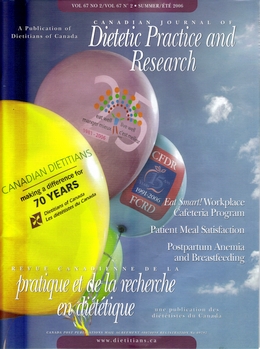Volume 67 • Number S1 • September 2006
Guest Editorial
Public Policy Statements
Background: Dietitians of Canada has endorsed the Principles and Framework for Enhancing Interdisciplinary Collaboration in Primary Health Care (EICP) created by the EICP Initiative. The Initiative focused on the conditions required for health professionals to work together in the most effective and efficient way, so that they can produce the best health outcomes for individuals and their families – the patients, clients, and consumers of our national health system. The Initiative was spearheaded by a Steering Committee of 11 national health professional organizations, and brought together leaders, health professionals, and key stakeholders in Canada's primary health care system in a change process designed to facilitate more interdisciplinary collaboration. Principles and Framework: In the context of the EICP Initiative, the Principles are values shared by stakeholders. They are critical to the establishment of collaboration and teamwork to achieve the best health outcomes. The elements of the Principles are patient/client engagement, a population health approach, the best possible care and services, access, trust and respect, and effective communication. The Framework builds upon these Principles and is composed of the structural and process elements required to support collaborative primary health care. The elements of the Framework are health human resources, funding, liability, regulation, information and communications technology, management and leadership, and planning and evaluation. Conclusions: The Boards of Directors of the ten health professions leading the EICP Initiative agreed upon the values and key structural and process elements that need to be put in place to enhance interdisciplinary collaboration in Primary Health Care in Canada. Dietitians of Canada will continue to seek opportunities to further the change process started by EICP. Approximately 40 research papers and a toolkit to help primary heath care providers work together have been produced.
Background: As one of 12 participating national health associations, Dietitians of Canada (DC) endorsed the Charter Principles and Commitments created by the Canadian Collaborative Mental Health Initiative (CCMHI). The Chair of the DC Board of Directors signed the Charter, committing DC to work collaboratively to uphold the Principles and actively endorse the Commitments. Achievements: The Initiative's vision, making mental health care work – new places, new partners, new hope, provided the Steering Committee with a clear direction. The CCMHI Charter Principles cover promotion and prevention, a holistic approach, collaboration, partnership, respect, information exchange, and resources. In addition to the Charter, the CCMHI has produced a series of 12 toolkits and research papers. The toolkits are practical pieces that also contain ideas and other information. Dietitians of Canada has developed a toolkit that examines the dietitian's role in primary health care mental health programs. A set of reviews of the practice of collaborative mental health care in Canada covers a wide range of issues, from the attributes of effective collaborative care to a discussion of the barriers to collaboration. Conclusion: Communications between the 12 member organizations are ongoing, and the organizations await the establishment of the Canadian Mental Health Commission, which is expected to be up and running in fall 2006.
Research
Purpose: A modified Delphi process was used to identify key features of interdisciplinary nutrition services, including provider roles and responsibilities for Ontario Family Health Networks (FHNs), a family physician-based type of primary care. Methods: Twenty-three representatives from interested professional organizations, including three FHN demonstration sites, completed a modified Delphi process. Participants reviewed evidence from a systematic literature review, a patient survey, a costing analysis, and key informant interview results before undertaking the Delphi process. Statements describing various options for services were developed at an in-person meeting, which was followed by two rounds of e-mail questionnaires. Teleconference discussions were held between rounds. Results: An interdisciplinary model with differing and complementary roles for health care providers emerged from the process. Additional key features addressing screening for nutrition problems, health promotion and disease prevention, team collaboration, planning and evaluation, administrative support, access to care, and medical directives/delegated acts were identified. Under the proposed model, the registered dietitian is the team member responsible for managing all aspects of nutrition services, from needs assessment to program delivery, as well as for supporting all providers’ nutrition services. Conclusions: The proposed interdisciplinary nutrition services model merits evaluation of cost, effectiveness, applicability, and sustainability in team-based primary care service settings.
Estimation of Human Resource Needs And Cost of Adding Registered Dietitians To Primary Care Networks
Purpose: Information on human resources and costs is needed to plan for the addition of registered dietitian (RD) services to new models of primary health care (PHC). Estimates were developed, based on an analysis of an enhanced RD model of counselling and health promotion services in three Ontario Family Health Networks (FHNs). Methods: Both direct and indirect costs were averaged over the three FHNs. Costs and RD activities were tracked throughout 2005. The FHN staff completed two questionnaires addressing communication, case management, and satisfaction with RD services. Results: Actual and reported case management indicated that an estimated 1.3% to 2.4% of the 60,000 enrolled patients may require individual nutrition counselling in a year. If one full-time equivalent (FTE) RD can manage 380 new referrals, then one FTE RD is needed per 15,800 to 29,000 patients. The estimated direct costs of adding one FTE RD (including expenses and fixed costs) is $78,169 to $80,169, when the RD is an independent contractor. Conclusions: Additional studies are needed to develop better estimates of human resource needs and costs of interdisciplinary nutrition services in all PHC settings. These estimates should be based on population characteristics and direct and indirect costs for all models of nutrition services in PHC settings.
Perspectives in Practice
Purpose: Primary health care reform presents new opportunities for registered dietitians (RDs) to contribute to health promotion and disease prevention in family practices. Since this is an emerging area of RD practice, a health promotion specialist was contracted to conduct a needs assessment and develop a plan for implementing nutrition-focused healthy lifestyle activities. Methods: The needs assessment was conducted as part of an Ontario-based demonstration project in three Family Health Networks (FHNs). Results: The needs assessment revealed a lack of agreement about what types of activities should be undertaken, a lack of information on the population's needs, a lack of coordination with other agencies in the community, and barriers of time and resources. The health promotion specialist recommended that health care team members in each FHN develop a shared understanding of their goals, and undertake the entire planning and evaluation cycle. Specific strategies were suggested to increase awareness, to provide health education, and to improve environmental support. Conclusions: A significant need exists for conceptual development, planning, testing, and evaluation of disease prevention and health promotion in family physician-based primary health care organizations. The findings may be useful to others interested in increasing the focus on health promotion and disease prevention in such practices.
Purpose: Individuals with mental illness are at nutritional risk because of health, social, and economic factors. To address this problem, the Canadian Collaborative Mental Health Initiative (CCMHI) and Dietitians of Canada (DC) commissioned the development of a toolkit that outlines the role of the registered dietitian (RD) and advocates for RDs in primary health care (PHC) mental health programs. Methods: The development of the toolkit followed a fourstage process: a comprehensive literature review, a focus group discussion with a national working group, interviews with consumers about RD services, and evaluation of the toolkit. Results: The costs of mental illness in Canada are at least $6.85 billion per year. Currently, little evidence exists on how RD services can reduce these expenses. The focus group identified accessibility as the predominant issue facing individuals with mental illness. To explain consumer experiences with RD services, a three-tier theory based on in-depth interviews was developed. Consumer experiences with RDs occur in five categories: financial concerns, perception of service, status of mental illness, engagement, and self-esteem (tier 1). These are further influenced by five individual and contextual factors, e.g., social environment, the mental illness (tier 2), which are weighed as benefits and barriers instrumental in determining actions (tier 3). Conclusions: The evaluation of the final draft of the RD toolkit confirmed that it reflected the visions of PHC. The toolkit is intended to act as a blueprint for action. Dietitians are encouraged to use its contents to advocate for positions in mental health PHC settings.
Report
Purpose: Primary health care (PHC) reform, especially efforts to implement interdisciplinary teams, has implications for dietetic practice. A consistent, clear vision of the registered dietitian’s (RD’s) role in PHC is needed to develop a successful advocacy agenda. Methods: The Dietitians of Canada (DC) Central and Southern Ontario Primary Health Care Action Group organized a four-step process to engage dietitians in developing an advocacy agenda for RD PHC services in Ontario. Two facilitated workshops brought together dietitian opinion leaders to enhance the understanding of current roles, find common ground, and develop a shared vision. All DC members were invited to review the draft vision, and feedback was integrated into a revised vision. Results: Registered dietitians saw PHC reform through many lenses, and were uncertain about how reforms would affect their practices. In a national review, the majority of reviewers (approximately 85% of 270) supported the draft vision; additional clarity was needed on resources and the breadth of services that RDs would provide. Conclusion: Development of a PHC vision for RDs should be helpful in advocating for dietitian services in PHC.










